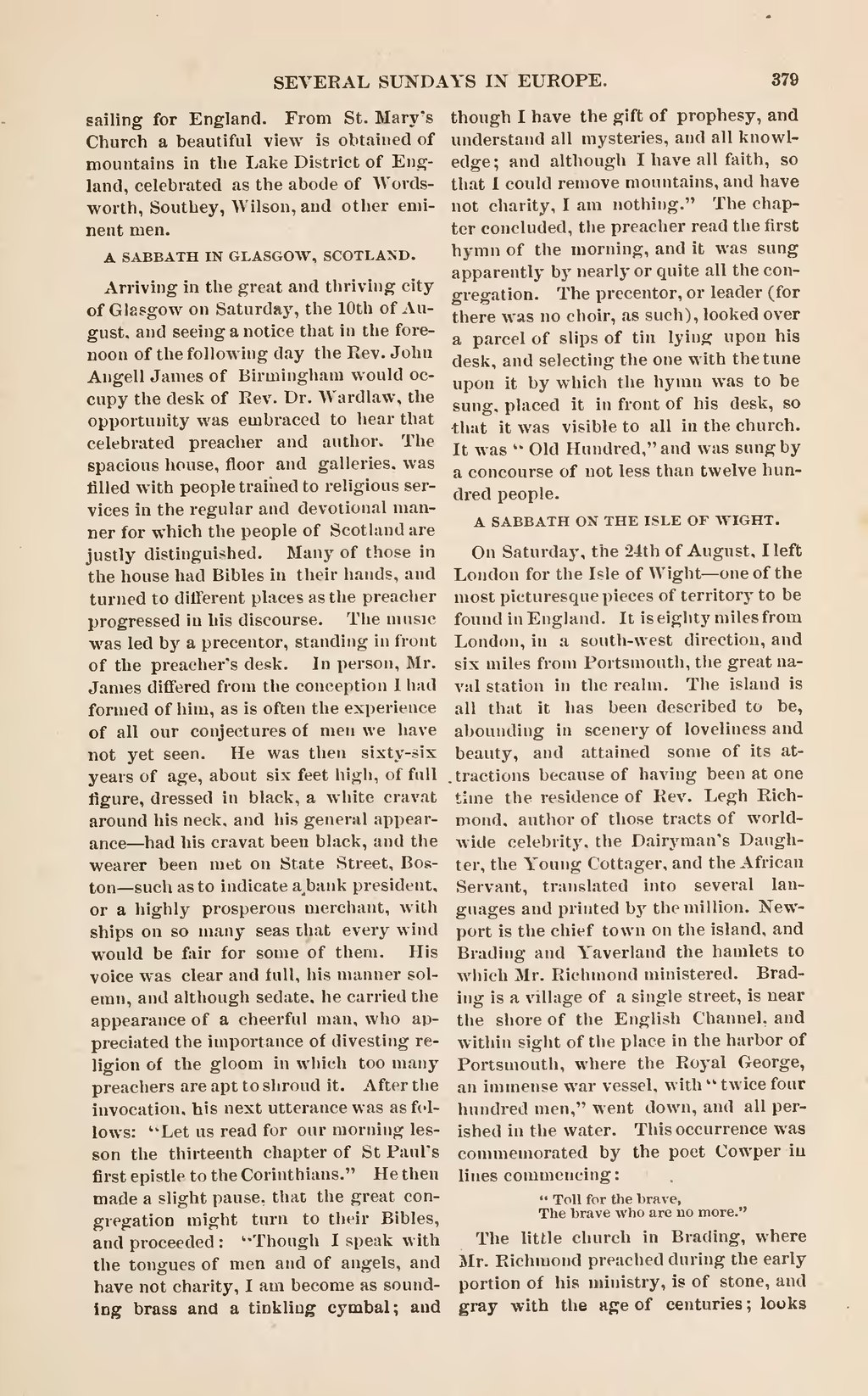SEVERAL SUNDAYS IN EUROPE.
��379
��sailing for England. From St. Mary's Church a beautiful view is obtained of mountains in the Lake District of Eng- land, celebrated as the abode of Words- worth, Southey, Wilson, and other emi- nent men.
A SABBATH IN GLASGOW, SCOTLAND.
Arriving in the great and thriving city of Glasgow on Saturday, the 10th of Au- gust, and seeing a notice that in the fore- noon of the following day the Rev. John Angell James of Birmingham would oc- cupy the desk of Rev. Dr. Wardlaw, the opportunity was embraced to hear that celebrated preacher and author. The spacious house, floor and galleries, was tilled with people trained to religious ser- vices in the regular and devotional man- ner for which the people of Scotland are justly distinguished. Many of those in the house had Bibles in their hands, and turned to different places as the preacher progressed in his discourse. The music was led by a precentor, standing in front of the preacher's desk. In person, Mr. James differed from the conception I had formed of him, as is often the experience of all our conjectures of men we have not yet seen. He was then sixty-six years of age, about six feet high, of full figure, dressed in black, a white cravat around his neck, and his general appear- ance — had his cravat been black, and the wearer been met on State Street, Bos- ton—such as to indicate ajbank president, or a highly prosperous merchant, with ships on so many seas that every wind would be fair for some of them. His voice was clear and full, his manner sol- emn, and although sedate, he carried the appearance of a cheerful man, who ap- preciated the importance of divesting re- ligion of the gloom in which too many preachers are apt to shroud it. After the invocation, his next utterance was as fol- lows: u Let us read for our morning les- son the thirteenth chapter of St Paul's first epistle to the Corinthians." He then made a slight pause, that the great con- gregation might turn to their Bibles, and proceeded : "Though I speak with the tongues of men and of angels, and have not charity, I am become as sound- ing brass and a tinkling cymbal; and
��though I have the gift of prophesy, and understand all mysteries, and all knowl- edge ; and although I have all faith, so that I could remove mountains, and have not charity, I am nothing." The chap- ter concluded, the preacher read the first hymn of the morning, and it was sung apparently by nearly or quite all the con- gregation. The precentor, or leader (for there was no choir, as such), looked over a parcel of slips of tin lying upon his desk, and selecting the one with the tune upon it by which the hymn was to be sung, placed it in front of his desk, so -that it was visible to all in the church. It was " Old Hundred," and was sung by a concourse of not less than twelve hun- dred people.
A SABBATH ON THE ISLE OF WIGHT.
On Saturday, the 24th of August, Heft London for the Isle of Wight — one of the most picturesque pieces of territory to be found in England. It is eighty miles from London, in a south-west direction, and six miles from Portsmouth, the great na- val station in the realm. The island is all that it has been described to be, abounding in scenery of loveliness and beauty, and attained some of its at- tractions because of having been at one time the residence of Rev. Legh Rich- mond, author of those tracts of world- wide celebrity, the Dairyman's Daugh- ter, the Young Cottager, and the African Servant, translated into several lan- guages and printed by the million. New- port is the chief town on the island, and Blading and Yaverland the hamlets to which Mr. Richmond ministered. Brad- ing is a village of a single street, is near the shore of the English Channel, and within sight of the place in the harbor of Portsmouth, where the Royal George, an immense war vessel, with kt twice four hundred men," went down, and all per- ished in the water. This occurrence was commemorated by the poet Cowper in lines commencing:
" Toll for the brave,
The brave who are no more."
The little church in Bracling, where Mr. Richmond preached during the early portion of his ministry, is of stone, and gray with the age of centuries ; looks
�� �
